Middle East
No sense in Gaza ceasefire talks amid Israel’s ‘hunger war’: Hamas | Israel-Palestine conflict News
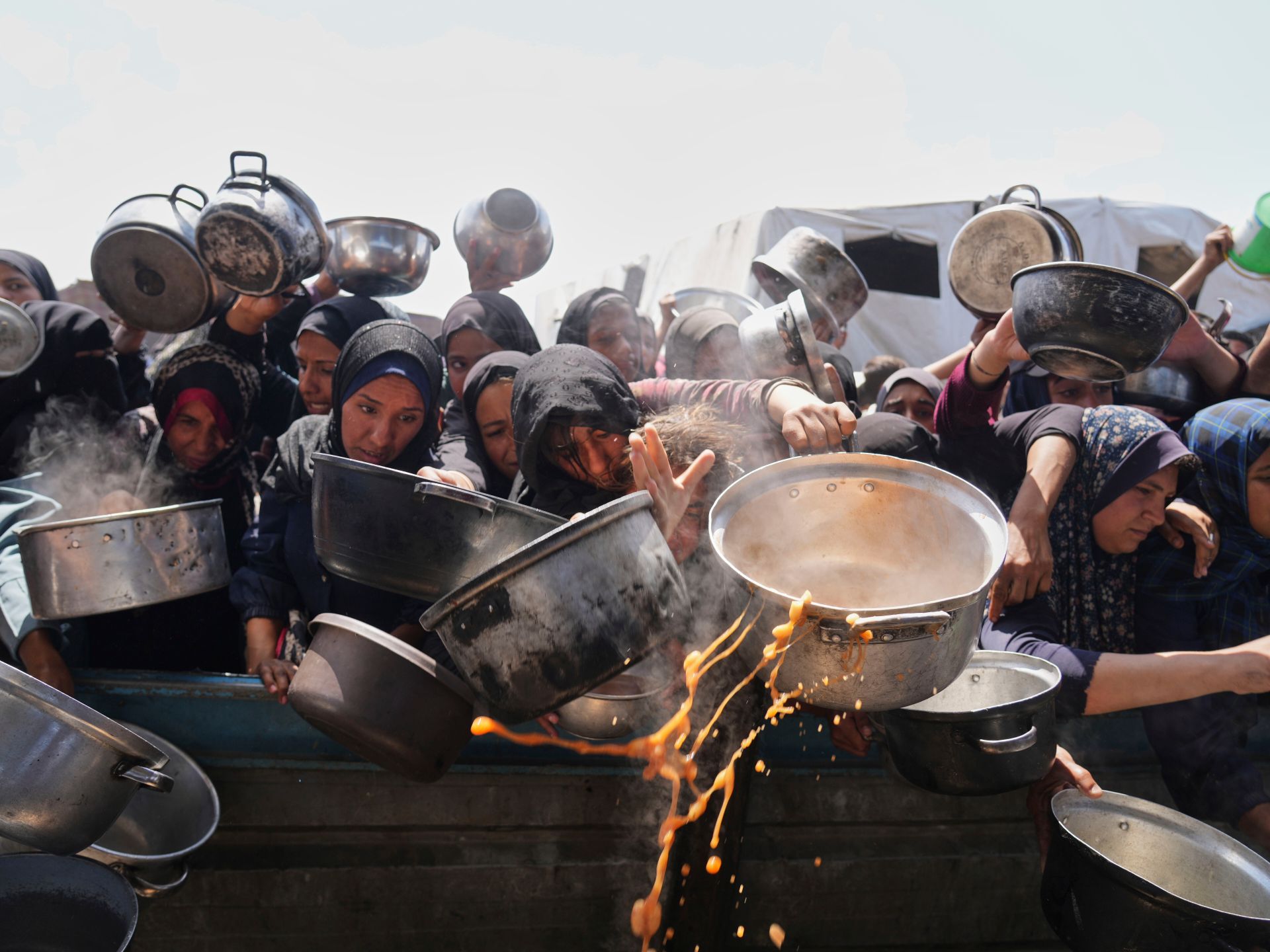
Hamas will no longer engage in ceasefire negotiations with Israel, seeing no point in doing so “as long as the hunger war and extermination war” continues on the Gaza Strip, according to the Palestinian group’s senior official.
Basem Naim told the AFP news agency on Tuesday that the international community must pressure the government of Israeli Prime Minister Benjamin Netanyahu to end the “crimes of hunger, thirst, and killings” in Gaza.
“There is no sense in engaging in talks or considering new ceasefire proposals as long as the hunger war and extermination war continue in the Gaza Strip,” he said.
Naim’s remarks came a day after Netanyahu said the population of the enclave “will be moved” in an upcoming expanded military operation by Israeli forces that would reportedly entail “the conquest of the Gaza Strip and the holding of the territories”.
Nearly all of Gaza’s 2.3 million residents have been displaced multiple times since Israel began its war on the Palestinian enclave in October 2023.
Total blockade
The humanitarian situation in the Gaza Strip has grown increasingly dire since a total blockade was imposed by Israel on March 2, causing widespread food shortages as Israel carries out deadly attacks across the enclave.
Al Jazeera’s Hind Khoudary, reporting from Deir el-Balah in central Gaza, said Palestinians are “struggling to find food to feed their children” with some “forced to eat expired or rotten food”, while others cannot find any form of sustenance.
The Palestine Red Crescent Society (PRCS) said this week that food supplies in Gaza have now “completely run out” in both local markets and humanitarian distribution centres.
“The population is once again at extreme risk of famine,” the PRCS said in its latest situation update. “There is an inability to meet even the minimum daily needs of over a million displaced people.”
According to the PRCS, only “limited quantities of legumes” are currently being distributed to community kitchens, as all previously stocked aid has been depleted.
The International Committee of the Red Cross (ICRC) echoed these concerns, calling for the immediate entry of humanitarian aid and warning against its politicisation.
“The level of need among civilians in Gaza right now is overwhelming,” said ICRC spokesperson Christian Cardon.
“Under international humanitarian law, Israel has an obligation to use all means available to ensure that the basic needs of the civilian population under its control are met,” he added.
![[Al Jazeera]](https://www.aljazeera.com/wp-content/uploads/2025/04/Interactive_Gaza_foodaid_timeline-1742987531-1744365779.webp?w=770&resize=770%2C963&quality=80)
Awad, 39, who lives in a tent in the southern Gaza city of Khan Younis, told Al Jazeera on Monday that “Israel has not stopped the war, the killing, the bombing, the destruction, the siege and the starvation – every day – so how can they talk about expanding military operations?
“I call on the world to witness the famine that grows and spreads every day,” he said.
Aya al-Skafy, a resident of Gaza City, told Al Jazeera on Monday that her baby died because of malnutrition and medicine shortages last week.
“She was four months old and weighed 2.8kg [6.2lb]. Because of severe malnutrition, she suffered from blood acidity, liver and kidney failure, and many other complications. Her hair and nails also fell out due to malnutrition.”
Israeli plans
According to leaked plans, Israel’s government reportedly wants to severely restrict the way food is distributed in Gaza and is proposing that United States companies take over distribution from the United Nations and other humanitarian agencies.
Under the plan, Palestinian families would be allowed to take one food parcel a week in designated hubs in southern Gaza, and Israel would permit 60 trucks to enter the Gaza Strip every day – just one-tenth of what’s needed, according to experts.
Aid groups in the UN have rejected this plan, saying it’s a pressure tactic to further reinforce control over life-saving supplies.
Middle East
Trump says bombing of Yemen to stop as Oman confirms US-Houthi ceasefire | Israel-Palestine conflict News
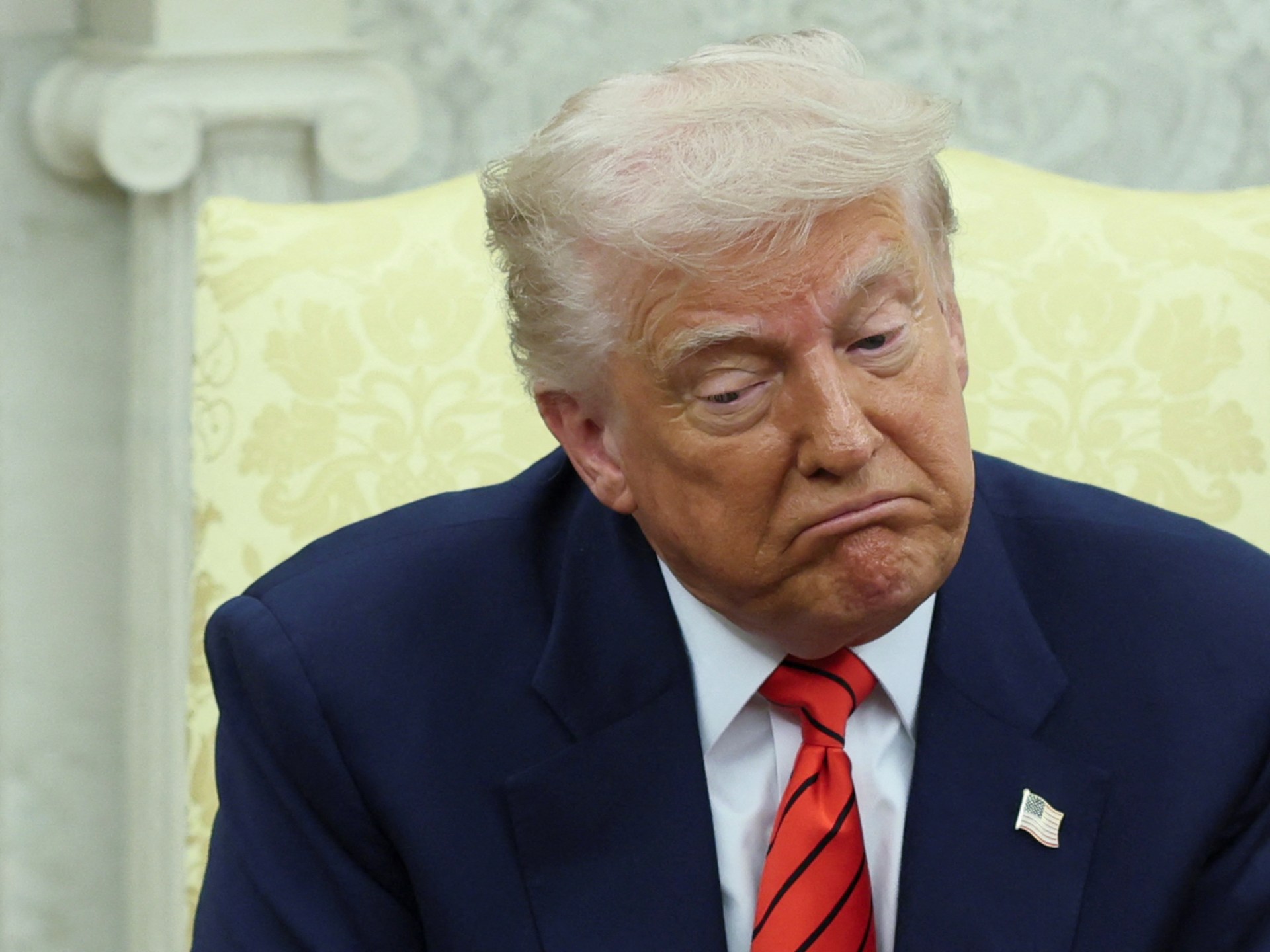
Oman says it brokers truce between Washington and Houthis, says neither side will target the other.
President Donald Trump has announced the United States is abandoning its daily bombing campaign of Yemen based on an understanding with the Houthis as Oman confirms that it has brokered a ceasefire between Washington and the armed group.
“The Houthis have announced to us that they don’t want to fight any more. They just don’t want to fight, and we will honour that, and we will stop the bombings,” Trump told reporters in the White House on Tuesday during a meeting with Canadian Prime Minister Mark Carney.
Trump claimed that the Iran-aligned Yemeni group “capitulated” and has promised not to carry out attacks on shipping. It launched those attacks in October 2023 shortly after the war in Gaza started, saying the attacks were in support of Palestinians.
“I will accept their word, and we will be stopping the bombing of Houthis, effective immediately,” the US president said.
Omani Foreign Minister Badr Albusaidi said the two sides have agreed to a ceasefire.
“Following recent discussions and contacts conducted by the Sultanate of Oman with the United States and the relevant authorities in Sana’a, in the Republic of Yemen, with the aim of de-escalation, efforts have resulted in a ceasefire agreement between the two sides,” he wrote in a post on X.
“In the future, neither side will target the other, including American vessels, in the Red Sea and Bab al-Mandab Strait, ensuring freedom of navigation and the smooth flow of international commercial shipping.”
Mohammed Ali al-Houthi, a member of the Houthis’ Supreme Political Council, wrote in a post on X that “Trump’s announcement of a halt to America’s aggression against Yemen will be evaluated on the ground first.”
“Yemen operations were and still are a support for Gaza to stop the aggression and bring in aid,” he added, suggesting that the group would not halt its attacks on Israel.
Reporting from Washington, DC, Al Jazeera’s Mike Hanna said that the US State Department clarified that the agreement did not relate to the conflict between Israel and the Houthis.
“It was made very clear by the US State Department that the deal relates directly to Houthi operations in the coast of Yemen, specifically in regard to US shipping,” he said.
The ceasefire announcement comes hours after the Israeli military launched air strikes on the airport in Sanaa, inflicting devastating damage and rendering it inoperable.
Dozens of Israeli warplanes also launched several waves of large-scale overnight strikes on Yemen’s vital port of Hodeidah in what Israel said was a response after the Houthis hit the perimeter of Tel Aviv’s Ben Gurion International Airport with a ballistic missile.
The US military has been launching daily air strikes across Yemen for nearly two months, destroying infrastructure and killing dozens of people, including children and civilians.
Al Jazeera’s Ali Hashem said it was “possible” that Iran helped to convince the Houthis to de-escalate their attacks.
“The Omanis have also been the main mediators between the US and Iran, and now the Houthis and the Americans. There are indications that the nuclear talks are advancing, with a framework shaping over sanctions lifting in exchange for nuclear restrictions,” he said.
“It is possible that the Iranians have helped in convincing the Houthis to de-escalate, especially if we see this reflected on the Iranian-American talks. It could have been an incentive for the nuclear talks to be done quicker.”
Middle East
Palestine and the decline of the US empire | Israel-Palestine conflict
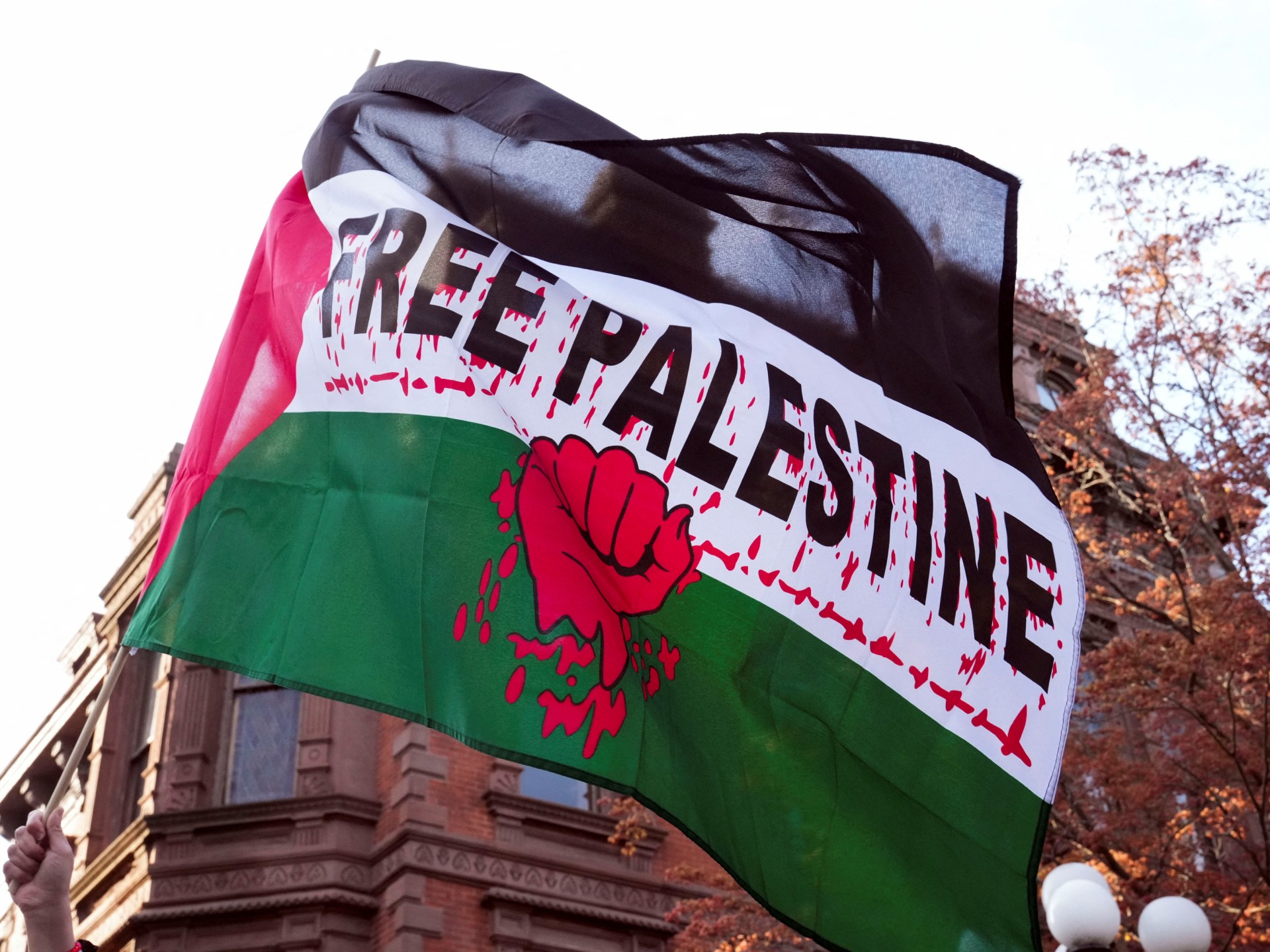
It has been 19 months now since the start of the Israeli war on Gaza. The International Court of Justice is investigating a “plausible genocide”, while the International Criminal Court has issued arrest warrants for Israeli Prime Minister Benjamin Netanyahu and his former Defence Minister Yoav Gallant for war crimes. Scholars of genocide, major human rights organisations, and United Nations experts have identified what is going on in Gaza as genocide. People across the world have marched to call on their governments to act to stop it.
There is a single power that stands in the way of putting an end to this genocide: the United States. One administration has handed over to another, and yet there has been no change in policy. Unconditional support for Israel seems to be a doctrine that the US political establishment is unwilling to touch.
Various analyses have suggested that at the root of this “special relationship” are Judeo-Christian values and a shared democratic path; others have argued that it has to do with the two-party system and the donor class dominating US politics.
But the reality is far simpler. The US views Israel as a critical ally because it helps promote US global supremacy at a time when it is facing inevitable decline. Israel’s survival in its current settler-colonial form – the US elites believe – is closely tied to maintaining US supremacy.
The supremacy of US empire
Since the collapse of the Soviet Union and the end of the Cold War, the US has been leading a unipolar world as the sole superpower.
As a continuation of Western imperial global dominance, the US empire holds much sway over global economic, political, and cultural matters, often with devastating consequences for the lives of millions of people around the world.
Like all empires, the US solidifies and expands its position of supremacy and hegemony in the world through its overwhelming military force. Through the US infrastructure of organised imperial violence, it is able to secure access to and control of resources, trade routes, and markets. This, in turn, guarantees continuous economic growth and dominance.
But in recent years, we have seen signs that US supremacy is being challenged. The momentum to do so built up in the aftermath of the 2008-2009 US financial crisis, which turned into a global one. It demonstrated the negative impact of US supremacy on the world economy and motivated powers such as China and India to take action to protect themselves from it. The BRICS coalition of economies emerged as their shared response on the economic front.
In the following years, various US foreign policy mishaps, including the US failure in Afghanistan, its waning influence in Africa and its inability to prevent the Russian invasion of Ukraine, also demonstrated the limits of US global power.
The rise of US President Donald Trump and far-right populism in the United States reflected the fact that cracks were appearing in the very core of the US-led so-called liberal order.
No empire has ever easily accepted its decline, and neither will the US. It intends to hold onto its status as the unquestionable superpower, and for that, it needs imperial outposts to stand loyally by its side.
Israel – the most reliable imperial ally
Throughout the Cold War, Western Europe and Israel stood as the US’s junior partners in its confrontation with the Soviet Union in Europe and the Middle East. Today, while the decades-old transatlantic alliance seems to somewhat falter, the US-Israeli relationship appears as strong as ever.
Israel has demonstrated loyalty as an imperial outpost. It has played a key role in supporting US imperialism in two ways.
First, Israel helps the US secure its access to and control over one of the most critical markets for any empire: the energy market. The Middle East is an important force in the global energy trade, and its oil and gas policies can have a tremendous impact on the world economy.
What the US fears the most is losing its dominance in the global energy markets to a competing power, which is why it wants to secure its interests by establishing a regional order in the Middle East that overwhelmingly favours its imperial power. This new order is about giving the US a major advantage over any competitor seeking to make inroads into the region, namely China.
For the administration of former US President Joe Biden and its successor, the Trump administration, the Israeli genocide of Palestinians and aggression against neighbouring countries are about establishing this new security reality in the region by eliminating hostile groups and governments. That is why US support for them has not stopped.
Second, Israel plays a critical role in advancing US military supremacy. The US provides Israel with billions of dollars in aid, which is in fact a form of self-investment in developing military capabilities and expanding sales. The Israeli state uses these funds to buy weapons from US arms manufacturers, which then use Israel’s deployment of that weaponry in the Middle East as testing and marketing tools. The US military-industrial complex is thus able to sell more weapons and continue to innovate and grow to ensure the US has a military edge over its rivals.
In this sense, Israel is one of the most critical parts of the US imperial machinery. Without it, the US would find it challenging to maintain its imperial power in the Middle East. It is for this reason that Biden once famously proclaimed that if Israel did not exist, the US would have to invent it.
Free Palestine and global decolonisation
Over the past year, we have witnessed an unprecedented attack on the Palestine solidarity movement in the US, which has affected all public spheres, including education and healthcare. We have also seen an intensification of US threats against states, such as South Africa, for their support for Palestine.
Based on the magnitude of the resources and energy that the US empire expends on the elimination and subjugation of Palestinians, one has to wonder, what is it about a stateless people with no economic and diplomatic capital or military power that terrifies the world’s sole superpower?
The answer is that the US empire views a free Palestine as the beginning of its own end.
The US is actively working to prevent the world from doing the right thing and isolating the Israeli state economically and politically because it fears what may come next. Such isolation would make it difficult for Israel to continue its existence as a settler colonial project, and ultimately could lead to a decolonisation process. The end result of that would be Palestinians and Israelis living together under a new decolonial political system that would be integrated into the region and would no longer serve imperial power.
A decolonised entity in Palestine/Israel would be a major step in the decolonisation of the world order itself and its liberation from US imperial power. And this is what the US dreads.
In this sense, it is in the self-interest of the overwhelming majority of the world’s nations to follow this path. The future of Palestinians, who are facing the real threat of elimination and total subjugation today, depends on this. And the future of many other nations, if they wish to avoid the current unspeakable brutalities that Palestinians are facing all on their own, also depends on this.
As much as the US needs a settler colonial Israel to stave off its decline, the world, particularly the Global South, needs a decolonised Palestine to hasten US decline. Palestine, not just metaphorically but literally, stands in the way of US and Western imperialism’s onward march towards continued global supremacy.
The views expressed in this article are the author’s own and do not necessarily reflect Al Jazeera’s editorial stance.
Middle East
Israel hits Yemen’s Houthi-controlled Sanaa airport in tit-for-tat attack | Houthis News
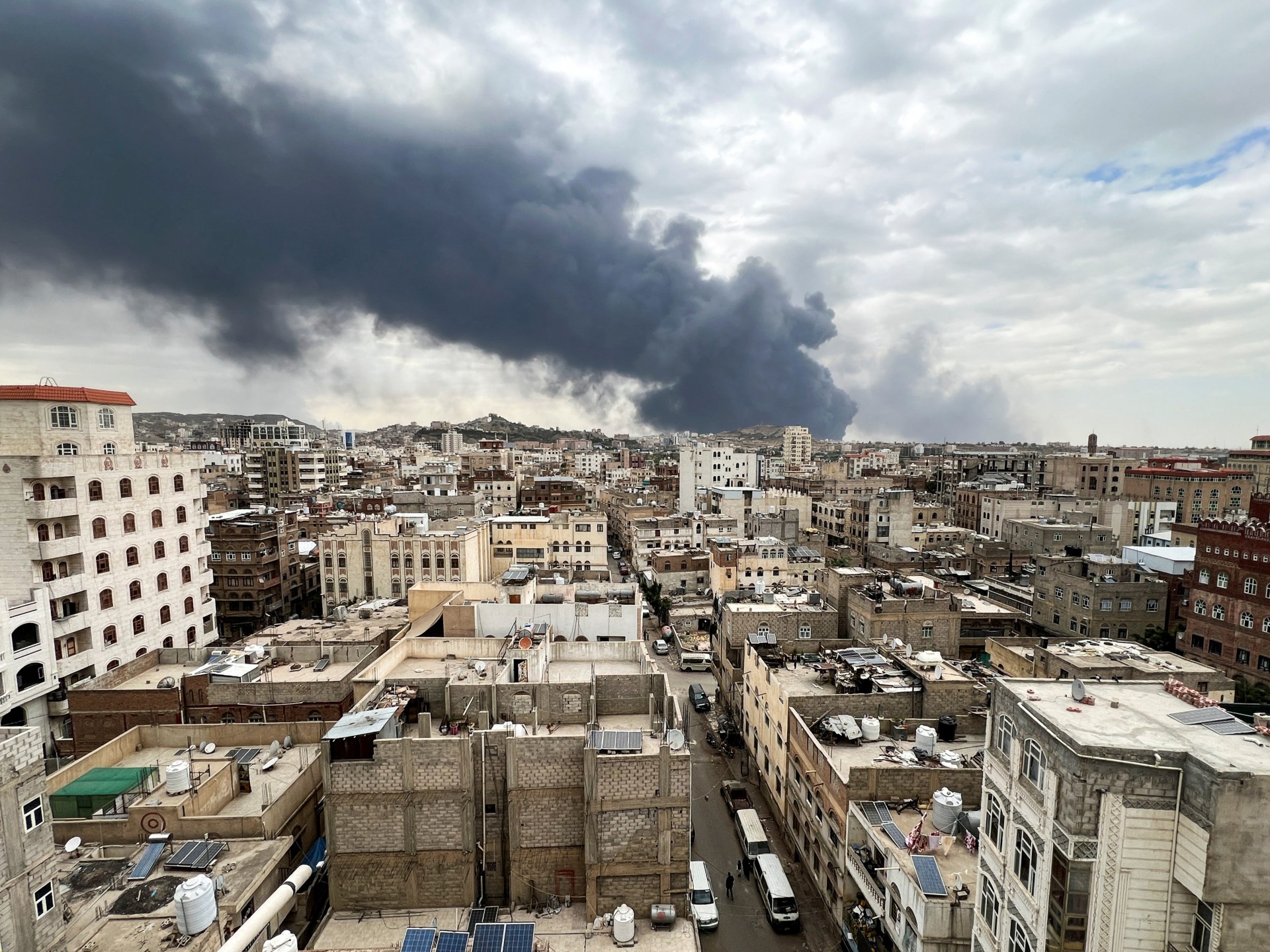
Israeli army claims ‘fully disabling’ the civilian facility, saying it also hit a concrete factory and power stations.
Israel has hit the main international airport of Yemen’s rebel-held capital Sanaa, “fully disabling” the civilian facility, according to the Israeli army.
Tuesday’s attacks that also targeted a concrete factory and several power stations in and around Sanaa came in response to Sunday’s ballistic missile strike near Tel Aviv’s Ben Gurion International Airport, the Israeli military statement said.
The army claimed that “the airport served as a central hub for the Houthi terrorist regime to transfer weapons and operatives”.
“The operation was approved by the Commander of the Air Force and the Chief of Staff,” it said. The military added that it would “continue to act and strike with force” any group that poses a threat to Israel.
Reporting from Sanaa, Al Jazeera’s Mohammed al-Attab said the results of the attacks were not yet clear.
“So far, we don’t know the impacts of this aerial bombardment on Sanaa International Airport or on the power station. We haven’t yet received any reports about casualties or impacts on the infrastructure,” he said.
‘Pure vandalism’
Sultan Barakat, a professor in public policy at Hamad Bin Khalifa University in Qatar, says Sanaa International Airport is “not a big strategic target” and that Israeli claims it is being used to receive supplies from Iran are “simply not true”.
“I think it’s pure vandalism, to be honest. The airport in Sanaa is not a normal airport. It’s under a huge restriction from the United Nations, from the Saudis, from the coalition – it’s under sanctions,” Barakat told Al Jazeera.
He added that attacking the airport will only hinder the operations of the United Nations and humanitarian agencies in one of the poorest countries in the world.
Footage of the aftermath of the airport attack, verified by Al Jazeera’s Sanad fact-checking unit, shows large clouds of dark smoke rising into the air over the capital.
Earlier, the Houthi-affiliated Al Masirah TV confirmed that among the sites targeted is a cement factory to the north of the capital and a power station in the Bani al-Harith area.
The attacks come less than 24 hours after Israel bombed the country’s key Hodeidah port, killing at least one person and wounding 35 others.
The Houthi media office said at least six strikes hit the crucial Hodeidah port. Others hit a cement factory in the district of Bajil, 55km (34 miles) northeast of Hodeidah, the group added.
The Israeli military said the strikes sought to undercut the Houthi military industry, claiming the factory is an “economic resource” for the Houthis and “used to build tunnels and military infrastructure”.
Since November 2023, the Houthis, also known as Ansar Allah, have launched more than 100 drone and missile attacks targeting vessels they said are linked to Israel in the Red Sea. The group says that it acts in support of the Palestinians in Gaza and that its attacks will stop only when there is a permanent ceasefire in the enclave.
Although the Houthis paused attacks during a fragile ceasefire in Gaza this year, they resumed their operations after Israel cut off humanitarian aid to Gaza and resumed its offensive in March.
The United States military under US President Donald Trump has launched an intensified campaign of air strikes on war-torn Yemen since March 15.
Israel has repeatedly struck Yemen, killing dozens of people, including women and children.
-
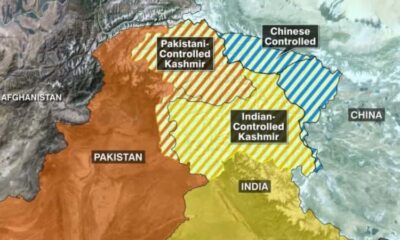
 Asia1 day ago
Asia1 day agoKashmir Fast Facts | CNN
-

 Middle East1 day ago
Middle East1 day agoIsrael bombs Yemen’s Hodeidah port after attack near Tel Aviv | Politics News
-

 Asia2 days ago
Asia2 days agoJapan and China accuse each other of violating airspace near disputed islands
-
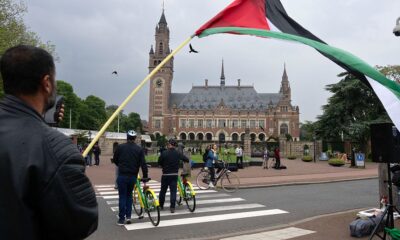
 Africa1 day ago
Africa1 day agoDemonstrators angry at ICJ’s decision to dismiss Sudan’s genocide case against UAE
-

 Conflict Zones1 day ago
Conflict Zones1 day agoGunmen kill three police officers in southern Russia’s Dagestan region | Crime News
-

 Sports1 day ago
Sports1 day agoOlympic swim great Gary Hall Jr. awarded 10 medals to replace those destroyed in LA fires
-

 Africa1 day ago
Africa1 day agoDRC: M23 rebels seize strategic town despite peace talks
-

 Sports2 days ago
Sports2 days agoScottie Sheffler ties PGA Tour record to claim first victory of 2025 at the CJ Cup Byron Nelson




